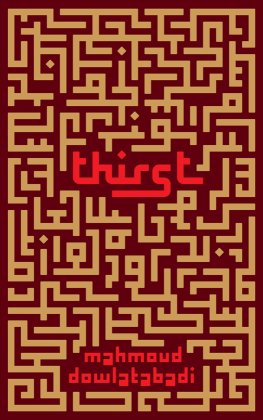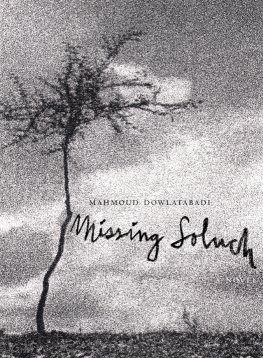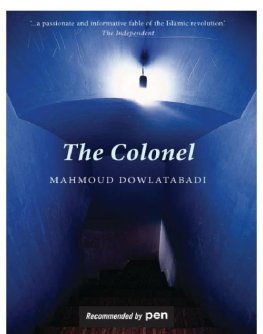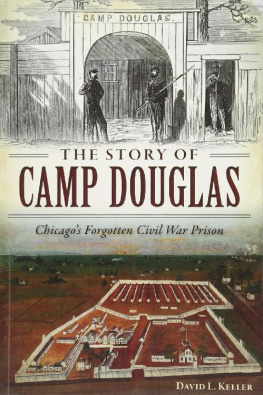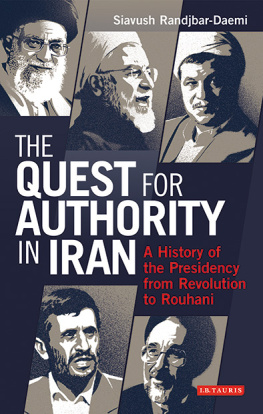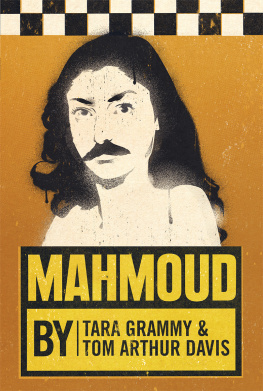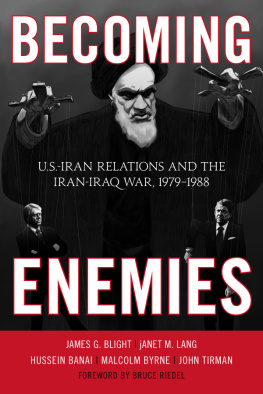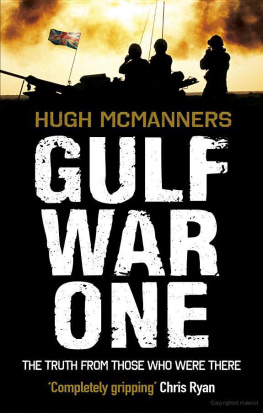Mahmoud Dowlatabadi
Thirst: A Novel of the Iran-Iraq War
SOMEWHERE, ON SOME SPOT here on planet Earth, a shell is discharged from the muzzle of a gun. No, let me rephrase that Somewhere, on some spot on planet Earth, a leaden shell, heavy and destructive, is fired from the long, wide barrel of a heavy mortar. We cant be more precise than that, unless we know how much explosive material is contained in that almost cone-shaped shell. But we dont, and perhaps the person who orders the firing button to be pressed doesnt know either. But why am I imagining a finger pressing a button at all? Maybe its a switch that is flicked instead. Up or down? How should I know? What difference does it make, and why should the components of a killing machine be important when they make such a fearsome unified whole? So, lets just say a shell was fired in order to drop from the sky somewhere on this Earth after following a trajectory that in my minds eye, seems long to explode, destroy and ignite a whole area and send a cloud of smoke billowing into the air.
Without doubt, whenever a shell is fired, it must have an intended target. If possible a specific one and if not a non-specific one. But on the particular scrap of land where our tale will unfold, the target happens to be both specific and non-specific. Specific because the setting is a battleground, and non-specific because someone far away, out of sight, has surmised that this area is a centre for resistance in the form of guerrilla warfare. And so, on the basis of this assumption, a bombardment began at sundown, starting at an inconspicuous location and eventually surrounding the young men of this story; and since it is nighttime and therefore impossible to show any flame or light, it is not clear how many from that small group survived. An order to retreat has been given, but no-one can tell whether anyone has escaped from the circle of fire in time, or whether they are lying on the ground at a distance, half-alive. Likewise, its unclear whether anyone has remained in position, dead, alive or wounded. Even if anyone should utter a sound, the din caused by the hail of bullets doesnt allow the soldiers to hear each others voices. The person who is moaning and calling for water must be quite close, in any event. But close to whom? Perhaps to those who are still alive and well.
Any number of shells have rained down. But that water tank still remains standing in one of the valleys between the hills up ahead. In all likelihood, it has shuddered several times from near misses, causing the water inside to spill over and run down the outside of the tank, but its still standing in the same gulley, seemingly immune to all gunfire. The tank should be safe for the time being, as its not in the enemys direct line of sight; unless, that is, their troops crawl out of their trenches, charge down the hill and happen upon it. But it seems that they have not yet been given the order to do so; if they did advance down the hill, they might find themselves trapped in the same gulley as the water tank, in plain sight and within range. Which would mean that anyone who opened fire could kill as many of them as he had bullets. So the hope is that, at least until this intense bombardment is over, the water tank will remain unscathed, while those soldiers who have fallen on the path leading from the tank to the trenches will also stay where they are, dead or alive. In the distance, between the brow of the hill and the water tank, some enemy soldiers have fallen dead or dropped to the ground: some of them before reaching the tank and some on their way back with full water bottles, some of which may still be intact, dangling from their necks and shoulders. But we can also assume that many of those flasks will be mangled and riddled with bullet holes. Now anyone who tries to fetch water will first have the difficult task of finding and quickly gathering up any empty, intact flasks before dashing down to the tank to get water.
But what if all the flasks are full of holes?
Al-atash, atash atashaan.*
Its the captive enemy who has piped up. Shut him up! one of the men responds. Perhaps, he continues, the hail of fire might cease if the enemy realises that weve taken one of their number prisoner. Another says with a bitter smirk: Yeah, right, like theyre capable of showing pity!
What are we to do then?
Good question, what are we to do! Its not like its our decision to make.
How many of us are left?
Only you, as far as I know. Until the sun rises a bit higher we cant tally up the survivors.
We mustnt raise our voices.
Atash atash atash! Ah ah jora
Hes getting restless. And my wrist feels like its about to snap; he keeps tugging on the rope. I think he must be dehydrated; what should we do with him?
Whatevers best for us. If you know his language, tell him therell be no water until the shooting stops. How many men should we martyr for some water? He saw what happened with his own eyes! Tend to his wound again. If the bleeding stops, hell survive.
Lets radio for help again. The radio telephone is still working.
When the order to retreat arrives, then well retreat. But right now, in this situation we cant.
So what do we do? What should we do?
Exactly what were doing now. Just keep your voice down. Now tell me what else is on your mind.
Im just thirsty, so thirsty.
Me too who isnt, if theyre still alive?
After sending in those RPG rounds they must reckon theres no one left.
Lets hope to God that they make that mistake. Thats why we must remain silent. Stop that young mans mouth with a rag. Thirst is driving him mad and might make him scream all of a sudden. Do it now, gag him, will you?
His injuries are fatal, though. Why dont we at least untie his wrist from mine?
Its a leg wound. His hands are fine.
Thats what Im saying. He cant escape!
Maybe not escape, but he could stick a bayonet in one of our backs when were not looking. Its his duty as a soldier and hes crazy now, as well.
So let me tie his hands together.
What if he unties them? Then youll be the first to get a bayonet in the back; hes your prisoner.
What can I do then? Im his captive too, as it stands; why dont I just put him out of his misery?
No need. His comrades might well see to that.
How long do you think well survive?
Till we shrivel up and die from lack of water.
When will it end?
What?
The night!
Im worried about the other trenches. Stay where you are, dont move! The other trenches arent stirring either; I dont know if theyre alive or dead. When the day finally dawns properly, well know for sure, as long as
As long as they dont just start bombing us again?
Would you like me to write them a pleading letter?
You think now is a good time to joke ?
What then? You want me to reprimand you instead?
No! Ive got an idea Lets exchange the captive for water!
Huh?
Our prisoner for water. How about it?
How do you know whats going on over there? Maybe theyve taken one of our men prisoner too.
Yes, maybe. Looking across to that hill, the far hill, the foot of the hill, the meadow, with metal shrapnel, spent shells, armoured personnel carriers, fire and suffocating smoke that keeps billowing up, ever higher into the sky and then more meadows and mountain passes and ditches and trenches and troop units, personnel carriers, comings and goings, trampled ditches all half-burnt. Earth, earth, water, water, water beyond the Shatt al-Arab, streams flowing on this side and the far side of the Shatt, a quiet city, houses in darkness and people breathing. People who are alive. But not necessarily. We cannot know what sort of lamp the other author behind the black curtains is using as the source of the weak light that illuminates his small kitchen table. A lantern or a hurricane lamp; a kerosene lamp or a candle? A candle for sure, a dim light; just enough to illuminate a white sheet of paper, which absorbs the light from the candle, stuck on a terracotta plate. The candle flame is flickering a bit, like in days of old, making the author appear like those ancient scribes who copied even older manuscripts: manuscripts in Kufic script, rewritten in Naskh. They developed hunched backs, those scribes, with their necks and shoulders constantly bent over, while the light of their eyes grew dim from early on, setting them on the inevitable path to blindness; and even if they didnt go completely blind, their sight would gradually diminish. They spent their time copying books for the libraries of some caliph or emir or other, which in all probability were seldom read such a difficult and strenuous task, one wonders what prompted them to take it up in the first place! Sitting crouched on a small carpet, with one knee laid flat on the ground and the other bent in front of them, their notebooks balanced on the upright knee and the reed quill held in their right hand, one pot of black ink and one pot of purple, with quills and quill cases next to the inkpots on a wooden tray or a plank scribbling away incessantly until their lives came to an end!

